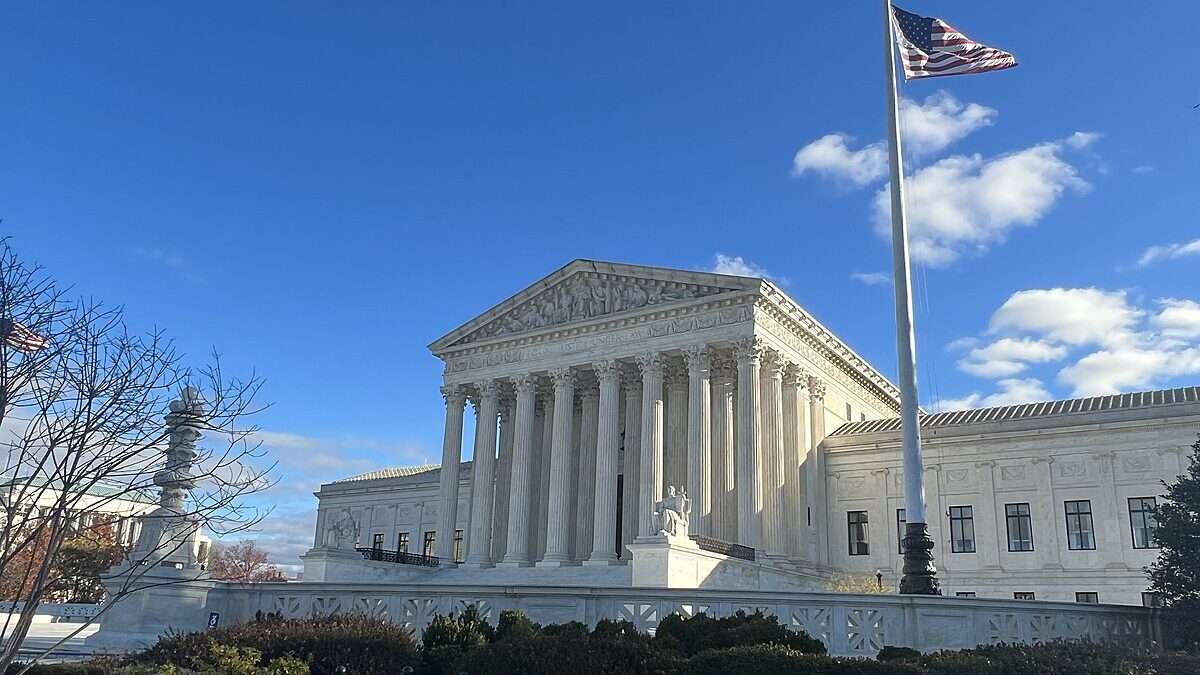Oral arguments in Gonzalez v. Google will take place on Tuesday. Nearly 30 years after its enactment, the Supreme Court will finally consider Section 230(c)(1) of the Communications Decency Act, which sets forth the basic liability regime for the internet. The Gonzalez plaintiffs are families of slain victims of the Paris, Istanbul, and San Bernardino terrorist attacks. They claim that YouTube’s targeted video recommendations motivated the terrorists who murdered their loved ones.
Section 230(c)(1), mirroring traditional liability rules for telegraphs and telephones, protects internet platforms from liability caused by their users’ statements. It simply states, “No provider or user of an interactive computer service [e.g., Google] shall be treated as the publisher or speaker of any information provided by” another user. If you libel your friend on Facebook, Section 230(c)(1) protects Facebook, limiting your friend’s legal recourse to suing you, but if Facebook wrongs a user with its own speech or action, Section 230(c)(1) does not apply.
In this suit, the question is whether algorithmically generated targeted recommendations should be considered “information provided by another” or the platform’s own speech. If targeted recommendations are considered YouTube’s speech, then Section 230(c)(1) provides no legal protection from this suit; if the recommendations are information provided by another, then Section 230(c)(1) offers protection. Google argues its recommendations are merely algorithmically reorganized speech of its users.
But this suit raises a more fundamental question. Because Gonzalez is the first time the court will examine Section 230(c)(1), the court may rule on how broadly that provision should be read. While some courts have read the provision correctly, many lower courts have expanded the purview of Section 230(c)(1) beyond any conceivable textual interpretation.
Numerous federal judges, most notably Justice Clarence Thomas, have recognized the lower courts’ unwarranted expansion of Section 230(c)(1). His statement concerning a denial of certiorari in the 2020 case correctly diagnosed how lower courts have expanded Section 230’s protection in absurd ways with no textual or statutory basis. In Gonzalez, if the court reaches this fundamental question, it must not ratify the lower courts’ flawed expansive reading — but rather should adopt Thomas’ textual reading.
Unfortunately, the inexplicable strategy of the Gonzalez plaintiffs has created doubt that the court will hear vigorous arguments on this fundamental question. The Gonzalez plaintiffs changed the question presented in their merits brief from that on which the court granted certiorari. Remarkably, the Gonzalez plaintiffs now agree with Google on Section 230(c)(1)’s scope. In light of the stakes involved and Gonzalez’s strange litigation moves, the court should dismiss the case as improvidently granted — or be very careful to rule narrowly and avoid ratifying faute de mieux parties’ flawed but now consonant positions on Section 230(c)(1)’s scope.
The Position of ‘Google and Friends’
The Gonzalez theory of liability seems outlandish. The plaintiffs claim that YouTube’s video recommendation led otherwise peaceful individuals to view increasingly politically radical videos and made them terrorists. The Gonzalez plaintiffs, in effect, posit that terrorists would have been mild-mannered Islamic theologians had not YouTube’s recommendations pushed them down a spiral vortex of political and religious radicalization. Lawyers, as a rule, advocate tenuous theories of legal causation only against defendants, such as YouTube, with very deep pockets.
Google wants to avoid even litigating Gonzalez’s strained claim of causation and looks to Section 230(c)(1). Google argues that algorithmic targeted recommendations are not its speech but simply the reorganized speech of its users. Therefore, Section 230(c)(1) bars Gonzalez’s claim.
But Google wants to ensure that whatever the court decides about targeted recommendations, the court answers the fundamental question about Section 230(c)(1)’s scope in a way it likes. Google wants its special, court-invented broad Section 230(c)(1) protections — about which Thomas had deep skepticism — to stay in place.
And when Google gets worried, armies of lawyers, lobbyists, think tankers, foundation apparatchiks, and academics get going. Indeed, the list of amici writing to support Google in the Supreme Court docket reads like a riparian map of Big Tech money flowing through the D.C. swamp and out into the broader sea of American institutions.
As for the broad questions of Section 230(c)(1)’s scope, Google and friends argue that, contrary to Thomas’ textual interpretation, Section 230(c)(1) should protect platforms’ “editorial function” or “editorial discretion,” i.e., anything internet platforms do concerning content on their platforms.
Confusingly, in addition to the editorial function test, Google also advocates the so-called “three-prong” test that does much the same thing. It simply rephrases the traditional editorial function test and makes it easier to defend.
But Google’s so-called three-prong test misstates Section 230(c)(1) liability protection in the following manner. Section 230(c)(1)’s protection involves three parties: (i) a plaintiff cannot bring action against (ii) platforms for liability that (iii) another user’s editorial discretion or decision-making creates. But the platform’s three-prong test cleverly omits the requirement that the liability is created by the content of “another,” i.e. someone who is not the platform nor the plaintiff.
Google’s three-prong test thereby wrongly applies Section 230(c)(1) to situations where the platforms’ own speech or editorial judgments create liability, i.e., a two-party dispute between the user and the platform. Relying on the platform’s flawed three-prong test, some courts have used Section 230(c)(1) to shield platforms from liability for their deceiving, defrauding, or even discriminating against users in violation of state consumer fraud, contract liability, and even civil rights law.
As Thomas has pointed out, the statute’s text, mirroring traditional telegraph and telephone liability, does not provide such broad protection. It only protects Google from being sued in actions, such as defamation, in which being the publisher of “information provided by another” is an element of the cause of action. It offers no relief from actions or fraud, discrimination, etc., in which being a publisher is not an element and which results from the platforms’ own decision-making and wrongdoing.
Advocates for a Textual Reading
A small band of amici, including Sen. Ted Cruz, Sen. Josh Hawley, Texas Attorney General Ken Paxton, and the Center for Renewing America (and myself), have urged the court to adopt a textual answer to the fundamental question about Section 230’s scope, following Thomas’ statement. Section 230(c)(1) means what it says. If you libel your friend on Facebook, Section 230(c)(1) protects Facebook, limiting your friend’s legal recourse to suing you — but if Facebook discriminates against or deceives a user, Section 230(c)(1) does not apply even if the dispute involves content Facebook publishes.
This textual approach still leaves open the second question — are targeted recommendations speech of YouTube or simply the aggregated speech of its users? To answer this question, more factual discovery is necessary. The court cannot determine whether YouTube’s recommendations result from its own beliefs or values and its desire to communicate them for the simple reason that the court doesn’t know how the algorithms work. If the court fails to dismiss the case for being improvidently granted, it should remand for additional discovery.
The Gonzalez Plaintiffs
So what about the Gonzalez plaintiffs? How do they come out on the fundamental question of Section 230(c)(1)’s scope? The plaintiffs’ petition for certiorari sought a review of the “traditional editorial function” interpretation of Section 230(c)(1).
Then the Gonzalez plaintiffs submitted an amicus brief in another case — the state of Florida’s certiorari petition appealing the 11th Circuit’s ruling striking down parts of the Florida social media law, S.B. 7072. There, the Gonzalez plaintiffs urged that the traditional editorial function interpretation preempts the Florida social media law, an argument Big Tech has made often. It is difficult to see how such an argument helps the Gonzalez plaintiffs at all. They argue for a broad reading of Section 230(c)(1) in the Florida case — and then for a narrow reading on their own.
Finally, in their own case’s merits brief, the Gonzalez plaintiffs abandoned the traditional editorial function test and offered the court a new question presented. They also switched to the three-prong test, abandoning the traditional editorial function test.
Google, in its response, while chastising the switch, agreed with the Gonzalez plaintiffs on the three-prong test. Gonzalez has united with Google, due to an inexplicable last-minute change, in urging a flawed test upon the court. Gonzalez only differs with Google as to whether targeted recommendations are Google’s own speech. Google seems fortunate to have such an obliging opposing party.
The court should dismiss this case as improvidently granted. It’s wrong to decide an issue of such importance — the scope of Section 230(c)(1) — without confidence that parties are properly briefing the court and have adequate motivations to bring forth all relevant arguments. If the court sets aside the fundamental question of Section 230(c)(1)’s scope to focus on the targeted recommendation issue, it should remand to the lower court for further discovery.









